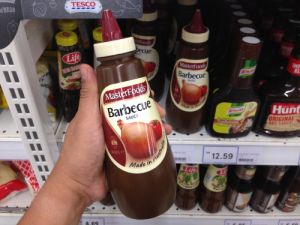A meal often isn’t complete without sauce. Snags, hot chips and other mouth-watering dishes just aren’t the same unless smothered in your choice of tomato or barbecue sauce. But while they can add another aspect to a dish – or completely save it if you’ve manage to burn it – sauces may also be adding to your waistline if you’re not careful.
With plenty of people jumping on the health bandwagon, the sauce aisle may be looking a bit different, with brands now offering low-salt or low-sugar varieties of our favourite condiments. But is there much difference between regular sauces, and their ‘healthier’ counterparts? In this article, Canstar Blue looks at the nutritional value of sauces, and if making the switch is worth the squeeze. But first, the context:
Is salt bad for you?

Salt has often been painted as the bad guy when it comes to nutrition, with many looking to smack the shaker out of your hand when it comes to dinner time. While used to add a flavour twist to meals, salt is also primarily used as a preservative, meaning take-aways and frozen meals are often packed with salt to ensure a longer shelf-life.
Plenty of studies – including Cook’s publication in BMJ – found a correlation between salt and health issues such as hypertension and other cardiovascular diseases, although studies such as those published in the European Heart Journal highlight that there might be more at play than simply salt intake. With plenty of debate in regards to salt, it may be worth investigating into its primary ingredient – sodium.
What is sodium?
Sodium is a chemical element, but in terms of the body, it’s an electrolyte that helps controls blood pressure through the removal of excess fluid. It can also play a part in muscle contraction and nerve conduction, helping you to function on a day-to-day basis, along with playing a part in keeping muscle cramps at bay. While it’s by no means the only chemical responsible for these functions, sodium does play a major part in ensuring your body is operating on all cylinders.
Despite its use in body functionality, too much sodium can present a range of issues, including high blood pressure, cardiovascular disease and kidney failure. As a result, it’s important to keep an eye on your sodium intake, as too much can impact on your health and wellbeing.
What is the recommended intake of sodium?
The Heart Foundation recommends less than 2,000mg of sodium a day – which equates to about 5g of salt – while the National Health and Medical Research Council recommends less than 1,000mg.
Your body loses sodium through dehydration or through a dilution of the electrolytes, but a regular diet and consistent intake of water should give you the recommended sodium for proper body functionality.
Sauces Compared
While most people either fall into the camp of tomato or BBQ sauce, which brand you grab is almost as big a decision as which flavour you choose. Below are a number of sauces you would regularly see on supermarket shelves, along with their nutritional information and sodium levels.
| Brand & Type | Protein | Fat | Carbs | Sugars | Sodium | Serving Size |
|---|---|---|---|---|---|---|
| MasterFoods Tomato Sauce | 0.2g | <0.1g | 4.5g | 4.1g | 130mg | 15mL |
| MasterFoods Tomato Sauce (Salt Reduced) | 0.2g | <0.1g | 3.0g | 2.6g | 89mg | 15mL |
| MasterFoods Barbecue Sauce | <0.1g | <0.1g | 9.5g | 6.9g | 164mg | 15mL |
| MasterFoods Barbecue Sauce (Reduced Salt & Sugar) | <0.1g | <0.1g | 6.5g | 5.0g | 81mg | 15mL |
| Heinz Tomato Ketchup | 0.2g | 0g | 3.9g | 3.9g | 125mg | 15mL |
| Heinz Tomato Ketchup (Less Added Sugar & Salt) | 0.2g | 0g | 2.0g | 1.8g | 60mg | 15mL |
| Heinz Tomato Sauce Ketchup Organic | 0.2g | 0g | 4.1g | 3.7g | 185mg | 15mL |
| Fountain Tomato Sauce | 0.3g | 0.01g | 5.4g | 5.0g | 175mg | 20mL |
| Fountain Tomato Sauce (No Added Sugar) | 0.3g | 0.05g | 3.0g | 2.3g | 98mg | 20mL |
| Fountain Barbecue Sauce | 0.1g | 0.01g | 10.9g | 9.7g | 188mg | 20mL |
| Fountain Barbecue Sauce (No Added Sugar) | 0.1g | 0.06g | 3.1g | 2.0g | 126mg | 20mL |
| Rosella Tomato Sauce | <1g | <1g | 4.3g | 3.4g | 204mg | 15mL |
| Rosella All Natural Tomato Sauce | <1g | <1g | 2.2g | 1.5g | 88mg | 15mL |
Information sourced from retailer websites, December 2018.
Time for a change?

As the table shows, the low-salt and low-sugar sauces live up to their names, with some going as far as halving the sugar and sodium intake in comparison to their regular sauces, giving families a healthier option to consider. But with the serving size only 15mL, you could be ingesting a lot more sugar and sodium than you realise, particularly if you’re mixing sauce through those big family meals or looking to cool down your meat pie. While your overall sodium intake will come down to your regular eating habits, switching to a low-salt sauce may be a good first step if you’re not sure where to start.
What about the price difference?
One of the biggest barriers we face when looking to make a health switch is price. Fresh, organic and overall healthier foods and drinks seem to cost an arm and a leg in comparison to junk food, meaning it often becomes a choice between losing weight around your midriff or losing weight in your wallet. But shoppers need not worry in this case, as sauces don’t seem to follow this trend, with the low-sugar and low-salt varieties costing the same as the regular sauces, meaning lowering your sodium intake won’t impact your budget. As a result, there doesn’t seem to be many arguments against making the switch to low-salt or low-sugar sauces, meaning a closer inspection of the sauce aisle of your local supermarket may help you get the lick on your salt intake.
Is low-salt or low-sugar sauce worth it?

We buy sauce to help with the taste of our favourite meals, with many of us not fully taking into account just what each bottle may be packed with. As a result, you may be going in the wrong direction if you’re looking to make good on your new year’s fitness resolution, or cut back on your salt intake.
While there’s a few factors that impact on which sauce you scan through the checkout – including budget, brand and bottle capacity – taste is arguably the biggest factor when it comes to which sauce makes it to the table for dinner time. And while some of us may be willing to give healthier sauces a fair shake, whether you stick with them will come down to your personal preferences and tastes.
While not the first thing you think of when it comes to cutting down sugar and salt intakes, it may be one area that can make a huge difference in the long run, particularly if you’re a fiend for something saucy. If you’re looking to get your diet on the straight and narrow, or you’re worried about your sodium intake, it’s best to consult your GP before making any changes to your eating habits.

Share this article